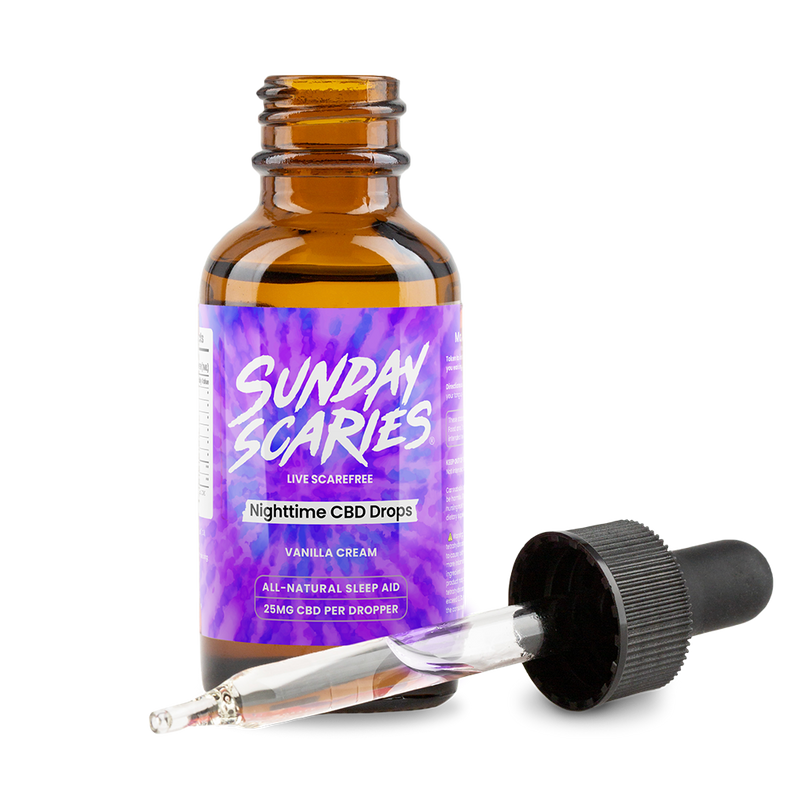
What Strength CBD Oil for Sleep?: Finding Your Ideal Dose

Navigating the world of CBD oil for better sleep can seem daunting, but the question at the forefront of many minds is simple: what strength CBD oil for sleep is most effective?
This article zeroes in on how to determine the right potency, from considering body mass to personal tolerance. By the end, you’ll better understand how to select the strength that could help you achieve restful nights.
Key Takeaways
- The ideal starting point of how much CBD oil for sleep is 25mg, although it depends on a variety of factors.
- CBD’s interaction with the endocannabinoid system may improve sleep, with factors like body weight and CBD type (full spectrum, broad spectrum, isolate) influencing the ideal dose.
- Starting with a low CBD dose and tracking effectiveness through a sleep log can aid in finding the perfect individual dosage, considering also the timing and consistency of intake.
- Quality CBD for sleep should come from reputable sources featuring third-party testing, and new users should read reviews from verified buyers to unlock anecdotal evidence on the efficacy of different CBD products.
What Strength CBD Oil for Sleep?
If you're looking to use CBD for sleep and you're unsure on the initial dosing, start with 25mg of CBD oil and scale up or down incrementally based on your reaction.
It's important to know that everyone is physiologically different, and there are multiple variables at play to determine the optimal strength needed for sleep.
Read on to learn how to tailor your CBD usage and find the best CBD dosage for you, personally.
Tailoring CBD Oil Dosage for Improved Sleep Quality
The dosage of CBD oil to enhance sleep varies among individuals, so while there's no standard dosage due to differences in body composition and health conditions, 25mg is a great starting point.
Starting with a low dosage and progressively increasing it is often recommended for identifying what works best for each person. Or, you may need to decrease the CBD dose if you feel it's too powerful or gives you a headache. (Read on to learn more about side effects).
Keep in mind that elements such as anxiety, pain, overall health, and individual reactions to CBD should be taken into account when customizing dosage for sleep, as these factors influence CBD’s effectiveness.
To help track the effectiveness and find the optimal dosage of CBD oil for sleep, maintaining a sleep log can be super beneficial.
The key is to not lose hope if you don’t find immediate relief. Oftentimes the effects of CBD oil compound over time, so it's best to use it for at least a month before determining if it's a supplement you want to continue using.
If you're looking to dig into more external and internal factors of CBD dosage, check out this article: How Much CBD Oil to Take for Sleep.
CBD Oil Strength for Sleep by Dosing Power
When choosing a CBD oil strength for sleep, it’s important to consider the individual factors such as body weight, the severity of sleep issues, and personal tolerance to CBD. But, here are some general guidelines based on the desired power you want to achieve:
Low Strength (5-10 mg per dose):
- Suitable for beginners or those with mild sleep issues.
- Helps promote relaxation and reduce anxiety.
Medium Strength (10-25 mg per dose):
- Good for moderate sleep issues or if the low strength is not effective.
- Provides a more noticeable calming effect and supports deeper sleep.
High Strength (25-50 mg per dose):
- Recommended for those with severe sleep disorders or high tolerance.
- May offer stronger sedative effects and improve overall sleep quality.
Very High Strength (50+ mg per dose):
- Typically used for chronic insomnia (although more studies need to be conducted and it's important to consult with a doctor) or more severe sleep disturbances.
- Should be used when a person rarely enters REM sleep.
Adjusting Your Dose: Signs You Need More or Less CBD
As with any supplement or medication, side effects are possible with CBD oil. Side effects such as:
- Headaches
- Upset stomach
- Nausea
- Dizziness
- Irritability
- Increased anxiety
may indicate the need to adjust your CBD dosage for sleep. If you feel too ‘amped’ after taking CBD, it could be an indicator to lower the dosage. This may help you find the right balance for your needs.
Remember, every person is unique, and what works for one individual may not work for another. Think about coffee intake. For one person two cups may be ideal, but for another a single cup may cause jitters or irritability.
It’s important to listen to your body and adjust your dosage accordingly to achieve the best results.
Frequency and Timing: When to Take CBD Oil for Sleep
When it comes to taking CBD oil for sleep, consistency is key. CBD oil should be taken consistently, and it may take several weeks or even a month to notice a positive difference in sleep patterns. But don’t be discouraged, the wait will be worth it.
Experimenting with the timing of your CBD intake can also be beneficial. Some people find that taking CBD an hour before bed works best, while others may prefer taking it 2-3 hours before bedtime.
Finding the timing that works best for you can make all the difference in improving your sleep quality and achieving a good night’s sleep.
To discover your optimal timing, check out this article: When to Take CBD Oil for Sleep? and if you want a guide to restful nights based on the onset time, check out this article: How Long Does CBD Oil Take to Work for Sleep?
Comparing CBD Oils: What Makes a Quality Sleep Aid?
Selecting the appropriate CBD product is essential in identifying the best dosage for sleep, so you can optimize for effectiveness.
Quality CBD oils for sleep are typically derived from legally grown hemp plants, which have high levels of CBD and minimal THC. Ensuring that the CBD product is legal and has sufficient potency (750mg to 1,500mg) is important to promote a restful sleep and adequately address sleep issues.
But how do you ensure that the product you’re choosing is of high quality and right for you? The key lies in understanding third-party testing, synergistic ingredients for sleep support, and the importance of reading reviews and experiences.
Importance of Third-Party Testing
In the rapidly expanding CBD market, lab tests by third parties are critical for validating the accuracy of CBD product labels, as demonstrated in their certificate of analysis (COA). Guaranteeing the quality and accuracy of CBD oil labels is fundamental to ensure that consumers receive a product that matches what’s advertised.
Independent labs carrying out third-party testing maintain objectivity and have no vested interest in the results, engendering trust in the product data.
The rigorous process of third-party lab testing ensures that the full-spectrum CBD oil is devoid of pesticides, heavy metals, and other toxins.
Verifying that CBD content accurately reflects labeling and is free from contaminants like heavy metals and pesticides is a critical aspect of third-party testing.
Synergistic Ingredients for Sleep Support
While CBD on its own can facilitate sleep, specific ingredients can amplify its impact. CBD and l-theanine, for example, work synergistically to help reset the sleep cycle and reduce body aches and stress, providing enhanced sleep support.
Many CBD products are also enhanced with 5-HTP, chamomile, lemon balm, valerian root or other calming agents that can help mitigate sleep disturbances and increase sleep quality.
The effectiveness of CBD oil for sleep can also be enhanced by including specific terpenes like myrcene or specific cannabinoids like CBN, or cannabinol, which have potential sedative effects to further supplement sleep-promoting properties.
Look for CBD products that contain these synergistic ingredients to maximize the benefits for sleep support, including sleep aids.
Sunday Scaries Hack: We advise against taking melatonin with CBD sleep oil, as it can cause nightmares and next-morning grogginess.
Remember, a well-rounded approach often yields the best results, so ensure your CBD sleep aid is boosted with other active ingredients.
Reading Reviews and Experiences
Customer experiences can offer invaluable insights when selecting a CBD product for sleep.
Users have reported improvements in stress levels and sleep after using CBD oil tinctures, with minimal side effects. CBD oil has been found to be the most popular product for sleep among different forms of CBD, since CBD gummies often contain sugar and CBD capsules need to be digested which decreases the onset time.
Reading reviews and experiences from verified buyers can help you make an informed decision and choose a CBD product that has worked well for others with similar sleep issues.
Understanding CBD Potency Labels
While deciphering CBD labels may seem overwhelming, it’s a vital step in identifying the appropriate CBD dosage.
CBD potency labels usually show the total amount of CBD in milligrams for the entire product as well as the concentration, measured in milligrams per milliliter (mg/mL).
But how does this information translate into dosages?
When CBD potency is not labeled, you can determine the dosage by calculating the total milligrams of CBD in the bottle, dividing by the volume of liquid, and then by the serving size or per drop. That being said, most reputable companies will label their CBD product correctly and clearly.
Grasping CBD labels is important not only for determining the correct dosage but also for ensuring that you get value for your money.
Misinterpretation could lead to taking a lower or higher dose than intended, which could either render the product ineffective or increase the risk of unwanted side effects.
The Role of Body Weight in Selecting CBD Strength
Are you aware that your body weight can impact the amount of CBD you should consume? Just like many other substances, the amount of CBD oil needed to support quality sleep can vary based on an individual’s body weight.
To determine a starting dosage, it’s typically recommended to use 1 to 6 mg of CBD for every 10 pounds of body weight, or around 2.5 mg per kilogram of body weight.
But don’t worry if math isn’t your strong suit - just start with 25mg of CBD oil.
Full Spectrum vs. Broad Spectrum vs. CBD Isolate
The three main types of CBD are full spectrum, broad spectrum, and CBD isolate, each identified by their particular composition.
Pure CBD contains only CBD isolate, while broad spectrum CBD and full spectrum CBD also include THC and additional cannabinoid phytochemicals such as terpenes, which can have different effects on sleep quality.
Being aware of the type of CBD you’re utilizing is essential in comprehending its potential impact on your sleep.
It’s usually specified on the product label as ‘full-spectrum CBD’, ‘broad-spectrum CBD’, or ‘CBD isolate’.
Among these, full spectrum CBD is recommended as the best CBD type for sleep due to it's balanced composition, the 'entourage effect' and added potential benefits.
Personal Stories: How CBD Users Found Their Right Strength
While research are crucial, firsthand accounts from individuals who have experienced the journey of how much CBD to use for sleep can offer further insights.
CBD users have diverse experiences with finding the right dosage for sleep. Some report immediate improvement, while others require time to adjust dosages for optimal results.
Check out the personal feedback from a Sunday Scaries customer below:
"I would struggle to fall asleep or get back to sleep with my mind wondering in all directions. CBD Sleep Oil from Sunday Scaries has helped me settle and get restful sleep. Other CBD oils I have used lead to some strange dreams, at times, which has not been the case either. Fully recommend buying if you have issues turning your brain off or falling back to sleep."
- Tim W. (Verified Buyer)
Summary
Navigating the world of CBD for sleep can be a journey filled with questions and uncertainties.
From understanding CBD potency to finding your ideal CBD dosage, the path to better sleep is highly personal and requires patience.
Whether you’re considering a full spectrum, broad spectrum, or CBD isolate product, remember to look for third-party testing, synergistic ingredients for sleep support, and personal reviews and experiences.
High-strength CBD oils may offer potential benefits for sleep, but it’s essential to be aware of the possible side effects and interactions with other medications.
Frequently Asked Questions
What is CBD and how does it promote restful sleep?
CBD is a non-psychotropic cannabinoid that works with our central nervous system to manage sleep disorders, anxiety, and stress, promoting restful sleep. It interacts with the endocannabinoid system, helping to address factors that may contribute to sleep issues.
How do I understand CBD potency labels?
When you're checking out CBD potency labels, look for the total CBD amount in milligrams and the concentration in milligrams per milliliter (mg/mL). This will help you figure out how much CBD you're taking.
How does my body weight influence CBD dosage for sleep?
Your body weight can determine the right CBD dosage for better sleep. As a starting point, it's recommended to use 1 to 6 mg of CBD for every 10 pounds of body weight.
What are the potential benefits and risks of high-strength CBD oils?
High-strength CBD oils may help with sleep and anxiety, but they can also have side effects like vomiting, diarrhea, dry mouth, reduced appetite, and rare cases of liver damage. It's important to be cautious, especially if you're taking other medications.
What do experts say about optimal CBD strength for sleep?
Experts suggest that lower doses of CBD may be effective for improving sleep, but the effects can vary over time, so ongoing dosing adjustments may be necessary.
What strength CBD gummies should I use for sleep?
When choosing CBD gummies for sleep, the strength can vary based on individual needs and tolerance. Generally, CBD edibles with 10-25 mg of CBD per gummy are a good starting point. Unlike THC gummies, even THC gummies for sleep which contain the psychoactive compound, CBD gummies help promote relaxation and improve sleep without the high. It's always best to start with a lower dose and adjust as needed.

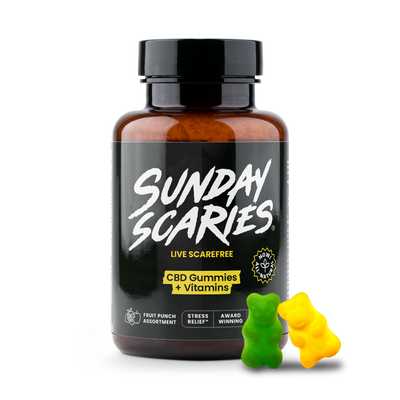 CBD Gummies
Stress Relief
CBD Gummies
Stress Relief
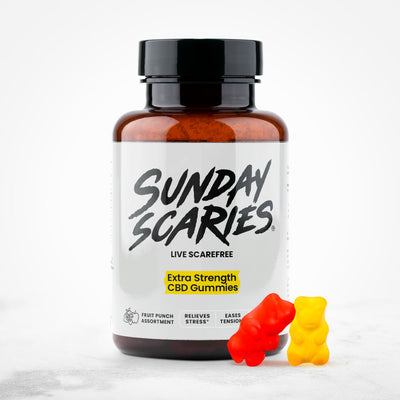 Extra Strength CBD Gummies
Stress Relief
Extra Strength CBD Gummies
Stress Relief
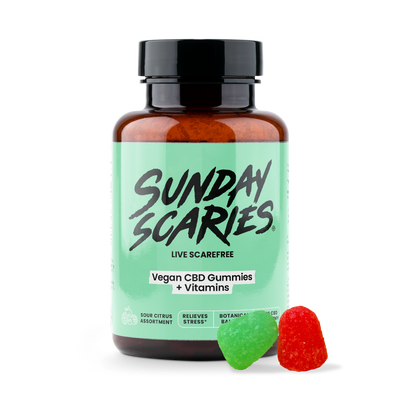 Vegan CBD Gummies
Stress Relief
Vegan CBD Gummies
Stress Relief
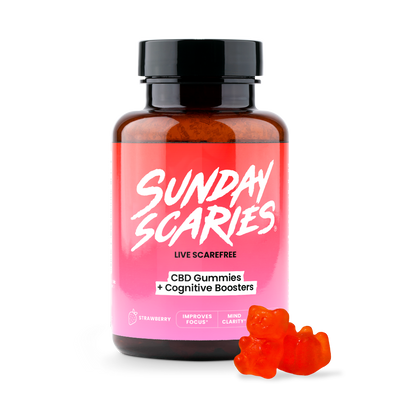 CBD Gummies for Focus
Focus Boost
CBD Gummies for Focus
Focus Boost
 CBD Candy
Mood Lift
CBD Candy
Mood Lift
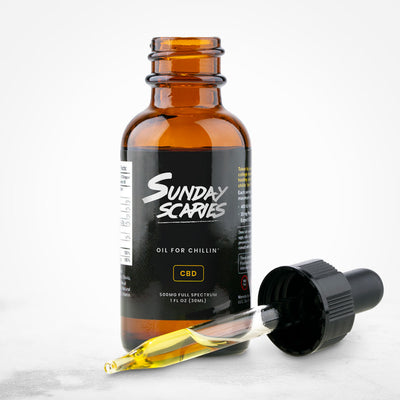 CBD Daytime Oil
Stress Relief
CBD Daytime Oil
Stress Relief
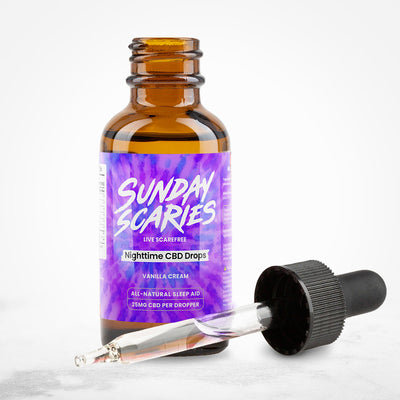 CBD Sleep Oil
Sleep Aid
CBD Sleep Oil
Sleep Aid
 CBD Dog Treats
Stress Relief
CBD Dog Treats
Stress Relief
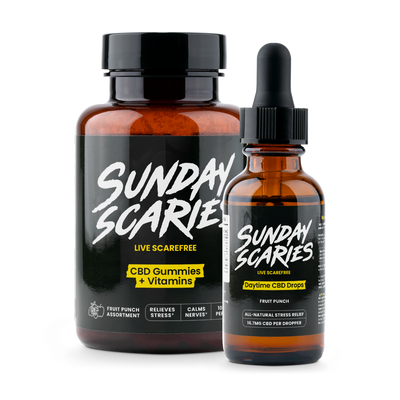 Side Piece Bundle
Stress Relief
Side Piece Bundle
Stress Relief
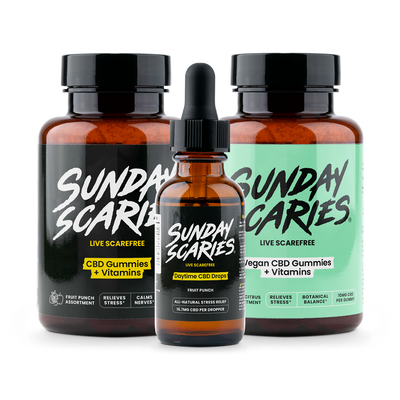 Rando Bundle
Stress Relief
Rando Bundle
Stress Relief
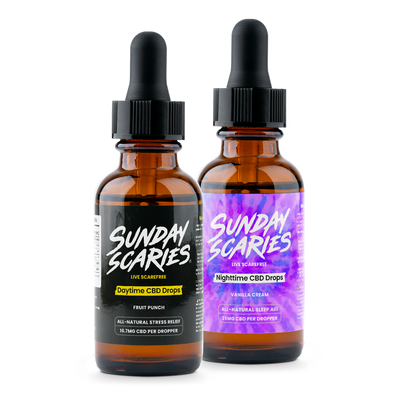 Sunrise & Sunset CBD Oil Bundle
Stress Relief
Sunrise & Sunset CBD Oil Bundle
Stress Relief
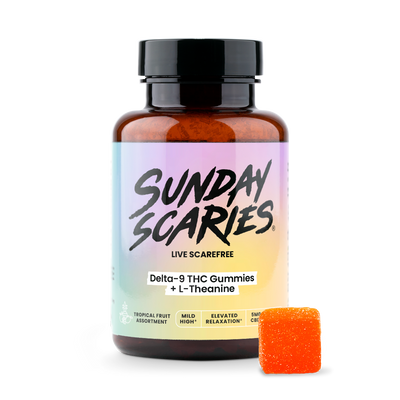 5mg Delta-9 Gummies
Euphoria
5mg Delta-9 Gummies
Euphoria
 10mg Delta-9 Gummies
Euphoria
10mg Delta-9 Gummies
Euphoria
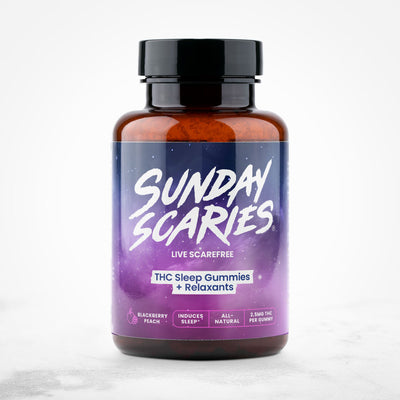 THC Gummies for Sleep
Sleep Aid
THC Gummies for Sleep
Sleep Aid
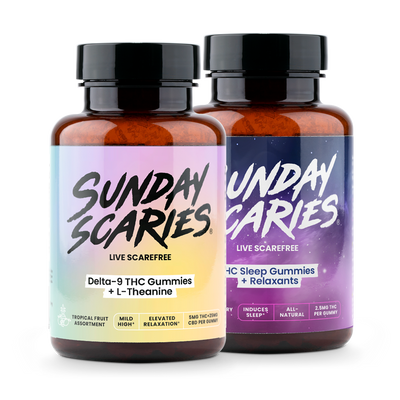 Day & Night THC Gummies Bundle
Stress Relief
Day & Night THC Gummies Bundle
Stress Relief
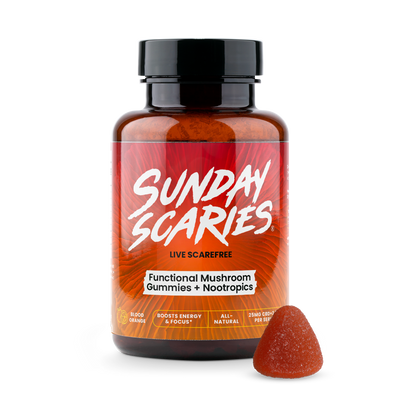 Mushroom Gummies
Focus Boost
Mushroom Gummies
Focus Boost
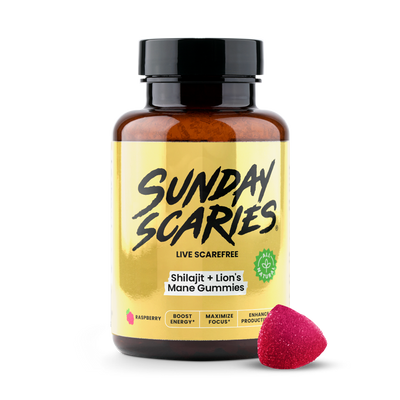 Shilajit Gummies
Focus Boost
Shilajit Gummies
Focus Boost
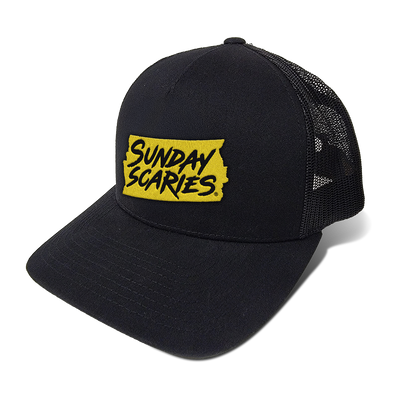 Sunday Scaries Hat
Sunday Scaries Hat
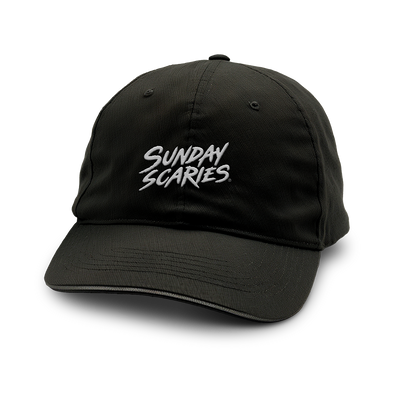 Sunday Scaries Dad Hat
Sunday Scaries Dad Hat
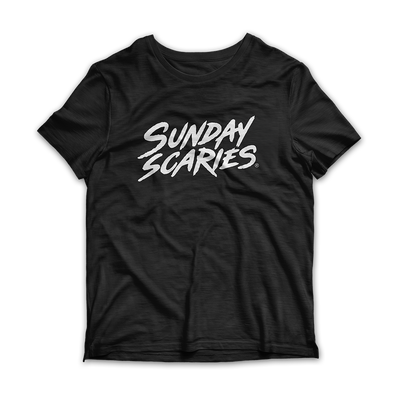 Sunday Scaries T-Shirt
Sunday Scaries T-Shirt
 Sunday Scaries Pocket Tee
Sunday Scaries Pocket Tee
 Sunday Scaries Tank Top
Sunday Scaries Tank Top
 Sunday Scaries Sweatshirt
Sunday Scaries Sweatshirt
 Sunday Scaries Blanket Jacket
Sunday Scaries Blanket Jacket
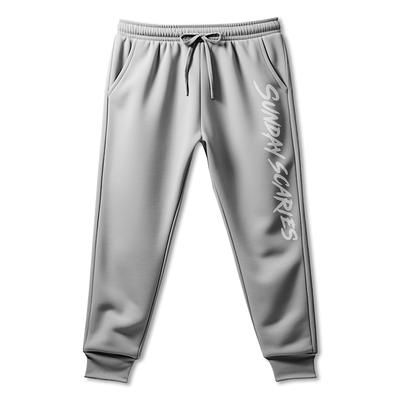 Sunday Scaries Sweatpants
Sunday Scaries Sweatpants

